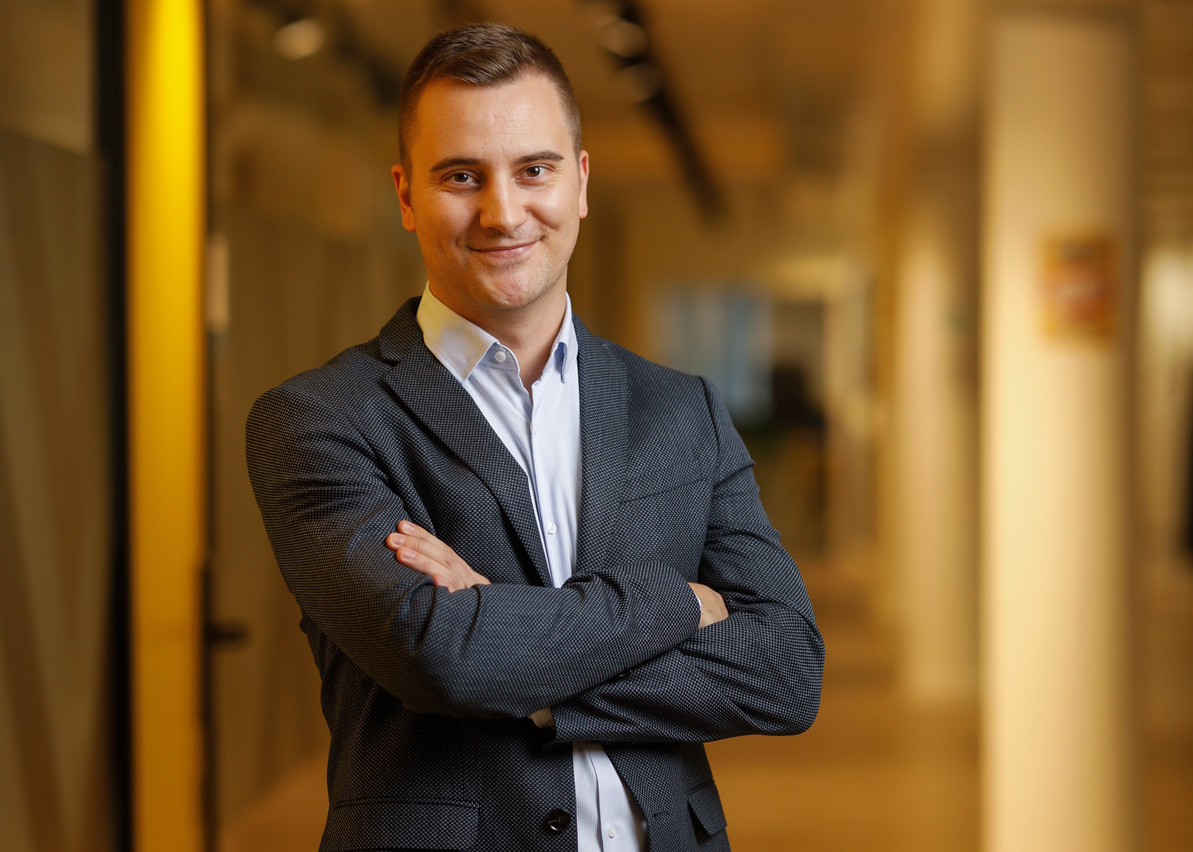Delano’s sister publication Paperjam is planning to meet with CEOs and managers to hear about how they have handled the coronavirus pandemic since its beginning. Tokeny CEO Luc Falempin was the first to confide in them.
Paperjam: Two years after the start of the pandemic, what is your most vivid memory?
Luc Falempin: It may be a bit personal, but my fiancée left two weeks before [the confinement in Luxembourg; editor’s note] for Bolivia. I found myself all alone, locked up at home, working 15 hours a day. So I made good progress! She finally returned in June 2021, more than a year later and we got married in October. The embassy in Bolivia that represents Luxembourg is the Spanish embassy, which was not working, so we ended up sending her file to Peru, to the Belgian embassy, so that she could have the paper in her passport. Luckily there was a time difference, so I could finish my day and be in contact with her.
It’s very difficult to brainstorm by video.
Tell me the story. It’s March 2020: what’s going on?
We switched directly to remote. It wasn’t too hard because part of the team had already been working from Spain, so we were already set up to work online, with the necessary tools and best practices. It went quite fast. We really upped our productivity at the beginning because we went from meeting to meeting much more quickly, not having to deal with traffic in the morning. However, in the long term, what we see is that it’s harder to keep people motivated, to pace ourselves, to separate the personal from the professional. It’s also very difficult to brainstorm by video. When there are clear tasks, it’s very simple, but when you have to innovate, it’s easier to see each other and say things, to see people’s reactions… all those types of interactions are a little bit lacking online.
When you’re confronted with their concerns, what do you do?
We spend a lot of time talking. We have more team briefings. Every month we have an update, I present what we have done and where we are going. We have also added, once a month (but staggered with the other meeting), a question-and-answer session for 30 minutes or an hour. Everyone can ask the questions they want. This allows us to get to the bottom of a lot of things. And we’ve added a few things, especially on Slack. We have a ‘random coffee’, a little bot that chooses who to have coffee with this week, which forces people to see other people without necessarily talking about work. It brings a bit of social life back into the company. We also have ‘talkeros’, small aperitifs once a month with little games.
How many of you are there?
There were 22 of us, and now we’re taking on eight more people. We’re doing quite well because we’re not looking for the profiles that everyone else is looking for. For example, all the banks are looking for blockchain developers. None of them are going to be on the market, but we are well-equipped for this type of profile. Before, we had fairly standard functions, but we are in an industry that attracts a lot of people. It’s hard work to find the right people.
As soon as someone had their vaccine or had symptoms of Covid, we would tell them to take the afternoon off or the day off, to make sure people don’t feel guilty about being sick.
How have you navigated the different sets of national rules, given that many of your employees are remotely based and outside of Luxembourg?
We have 13 nationalities, and people working in Luxembourg, Spain, Turkey, Greece, France and Brazil. A little bit of everywhere. I try to keep myself informed about the various rules and to guide them. But it’s up to them to inform themselves. We try to keep an eye on everything that’s going on. We were very open about vaccines. As soon as someone had their vaccine or had symptoms of Covid, we would tell them to take the afternoon off or the day off, to make sure people didn’t feel guilty about being sick. A good half of the team had Covid. And it was difficult for those with children, being at home without being able to concentrate for two hours properly. On the other hand, they appreciate that we are a bit more flexible. As long as it’s worse elsewhere!
In two years, you have made a lot of progress and struck many deals.
It’s made us progress enormously. Everyone went remote overnight, especially the big financial institutions, which were very difficult to approach without physical meetings--the big groups have a lot of meetings--but suddenly, almost overnight, everyone was making online calls, and we could more easily organise a 30-minute or one-hour call.
Is it harder to have “sincere” contacts with prospects virtually, or is it more direct and efficient?
A bit of both. Financial institutions are more and more interested in blockchain: they have teams working on these topics, but they need us to understand and to have solutions to implement quickly. It’s very easy to get the first calls, to present ourselves and our solutions. We understand very well, between the lines, what they are hoping for. But afterwards it’s difficult to create a relationship to make sure that we have the most important information to offer them solutions that really correspond to their needs.
Especially as what you do is not necessarily accessible to everyone…
It’s also part of our role to educate the market, to show the important components, in our opinion. We’re starting to do some events again, and it will be really important for us to invite the people we talk to every week, to see what we’re up to.
This article in Paperjam. It has been translated and edited for Delano.


